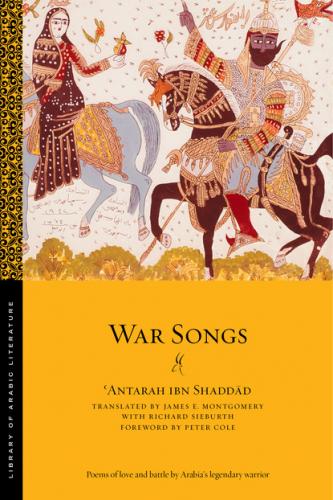The entry on ʿAntarah in al-Iṣbahānī’s Great Book of Songs (Kitāb al-Aghānī al-kabīr) (Appendix 2), a sweeping panorama of Arabic court culture, musical history, and poetic creativity across the ages, may be longer and somewhat more involved than that of Ibn Qutaybah, but it shares the same basic structure, with the addition of recapitulations and alternative versions of key incidents, as well as notes on musical performances of ʿAntarah’s verses and sections explaining difficult, obsolete, and obscure vocabulary. Interestingly, al-Iṣbahānī’s version of the seduction of ʿAntarah by his father’s wife, so reminiscent of Zulaykhah’s attempted seduction of Joseph in the Qurʾan (Q 12 (Yūsuf)), is quoted by al-Baṭalyawsī.45
More significant, however, is a narrative given by both al-Iṣbahānī and al-Baṭalyawsī: the incident in which ʿAntarah’s valor incurs the animosity of Qays ibn Zuhayr.46 Al-Iṣbahānī’s source is Abū ʿAmr al-Shaybānī; al-Baṭalyawsī’s is Ibn al-Sikkīt, from whom he also derives the obscure tale of ʿAntarah’s brothers and their colt, which according to al-Iṣbahānī originates with both Ibn al-Aʿrābī and Abū ʿUbaydah (via al-Sukkarī and Ibn Ḥabīb).47 The tale of ʿAntarah’s death is also shared by both sources.48 Al-Baṭalyawsī gets his version from the Egyptian grammarian Ibn al-Naḥḥās (d. 338/950), al-Iṣbahānī his version from Abū ʿUbaydah and Ibn al-Kalbī.49 This brief comparison suggests that al-Baṭalyawsī may have had access to sources that included a range of material possibly originating from the first century of the discovery of ʿAntarah.
Конец ознакомительного фрагмента.
Текст предоставлен ООО «ЛитРес».
Прочитайте эту книгу целиком, купив полную легальную версию на ЛитРес.
Безопасно оплатить книгу можно банковской картой Visa, MasterCard, Maestro, со счета мобильного телефона, с платежного терминала, в салоне МТС или Связной, через PayPal, WebMoney, Яндекс.Деньги, QIWI Кошелек, бонусными картами или другим удобным Вам способом.
